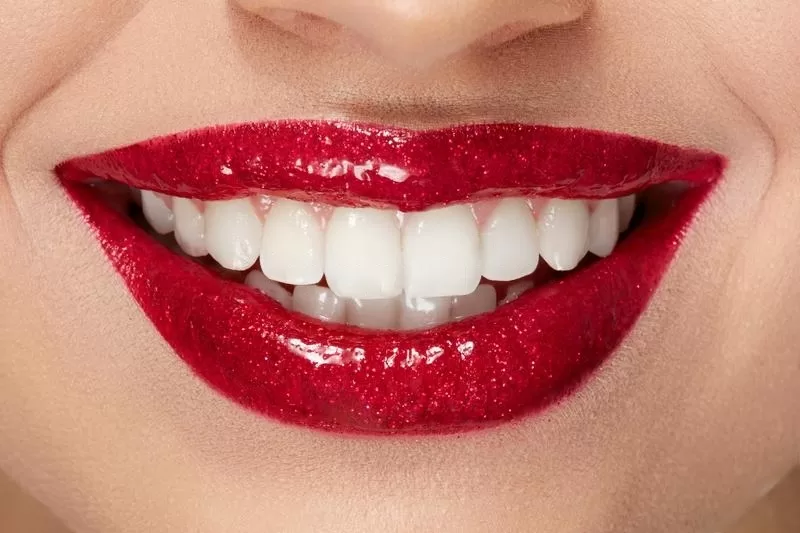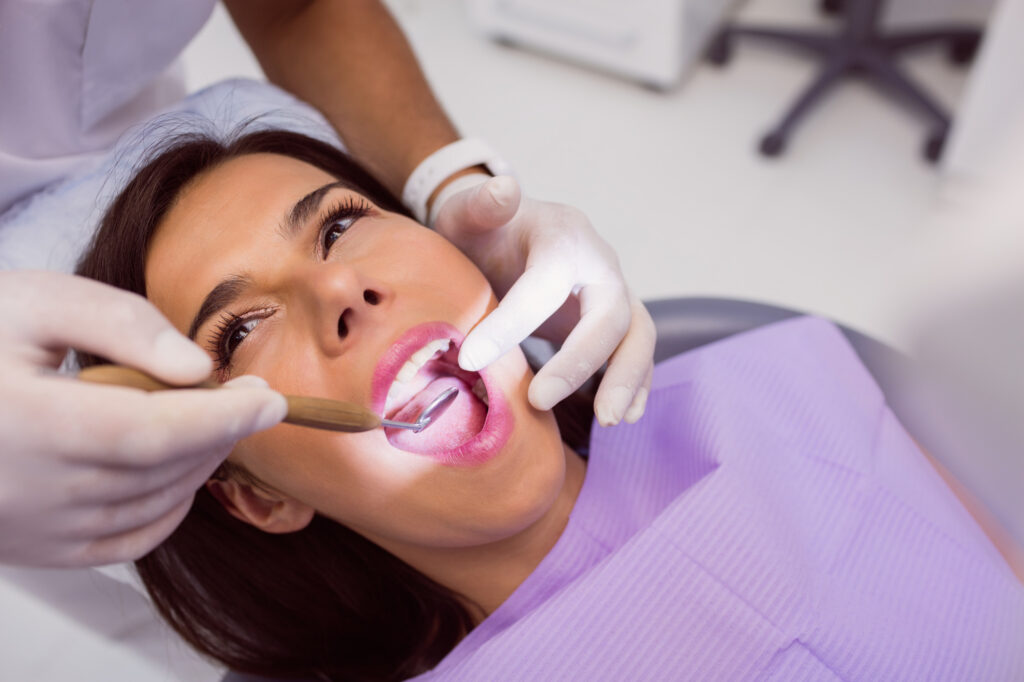It’s not easy to keep your mouth and teeth in tip-top shape while also keeping them pearly white. When your teeth and gums are healthy, you find it much simpler to eat well and take pleasure in good food. Several factors can affect oral health, but regular brushing and flossing can help you keep your teeth and gums in good condition as you age.

Before moving ahead let’s first take a look at the Do’s and Dont’s
Do’s:
- For whiter teeth, rub the inner fibrous part of the peel of a ripe banana.
- In order to get rid of yellow stains and tartar, rub the juice of half a lemon on your teeth firmly but gently.
- Excellent results can be obtained by rubbing a mixture of half a teaspoon of baking soda and a pinch of salt on the teeth with a fingertip.
- Strawberries are a natural way to brighten your smile. They can be used either whole or cut in half and rubbed on the teeth.
- Just a few minutes of brushing with a toothbrush dipped in hydrogen peroxide can whiten your teeth dramatically.
- Using regular table salt, you can scrub the discoloration off your teeth. For the most effective use, rely on your fingertips.
- To whiten teeth, rub the inside of an orange peel against them.
- Apples, carrots, cucumbers, celery, and parsley are just a few of the crunchy fruits and vegetables that can help you get rid of stubborn tooth stains when you munch on them
Dont’s:
- Acids in fizzy drinks wear away tooth enamel, leaving teeth vulnerable and discolored.
- Cocaine, ecstasy, and other drugs have a telling effect on the teeth because they decrease blood flow to the gums, resulting in severe gum recession and eventual tooth loss.
- As with general health, dental health is negatively affected by smoking. When nicotine remains on teeth, it causes a yellow discoloration.
- The pigment and sugar in dark-colored juices, such as cranberry juice, stain teeth. Always use a straw when consuming juices of this nature.
- Even black coffee can be harmful to your teeth’s brightness.
- It is commonly believed that tomato sauce and balsamic vinegar can discolor teeth.
- It’s common knowledge that drinking red wine can discolor teeth and weaken enamel. When you just want to gargle with water, that’s what you should do at social gatherings.
- Black tea can stain your teeth, so green or herbal tea is preferable.
The decay of one’s teeth
Enamel is the tough, outer coating that safeguards your teeth. Throughout the day, a sticky biofilm called plaque develops on your teeth. Cavities are caused by acids produced by plaque bacteria, which eat away at tooth enamel. Preventing cavities with regular brushing and flossing is ideal, but once a cavity has formed, it must be filled by a dentist.
Use fluoride toothpaste to prevent tooth decay. A higher risk of tooth decay may necessitate a higher fluoride intake (for example, if you have a dry mouth due to a condition or medications you take). Your dentist or your dental hygienist may recommend fluoride treatment during an appointment, or they may give you a take-home product to use.
To put it simply, gum disease is an infection of the gums.
Gum disease is caused by the accumulation of plaque along and under the gum line. The infection caused by plaque can weaken the tissues and bones that keep your teeth in place. If you have even a mild case of gum disease, your gums may become red, tender, and bleed easily. Consistent brushing and flossing can reverse gingivitis.
In order to treat periodontitis, the advanced stage of gum disease, a visit to the dentist is necessary. If you don’t treat this infection, it can make your gums hurt and bleed, make it hard to chew, or even cause you to lose a tooth.
Here are some preventative measures you can take to keep gum disease at bay:
- Make sure to use fluoride toothpaste twice a day when brushing your teeth.
- Be sure to floss on a regular basis.
- Always remember to schedule regular dental checkups and cleanings. It is important to be honest with your dentist about any illnesses or medications you are taking.
- Eat a balanced, nutritious diet.
- We urge smokers to put down their cigarettes. Tobacco use increases the likelihood of developing gum disease.
Preventative Care for Your Teeth and Gums: Brushing and Flossing
It’s crucial to take care of your teeth by brushing and flossing regularly. A daily: a photo sequence showing proper dental flossing technique.

Using fluoride toothpaste and a soft-bristled toothbrush, thoroughly clean all surfaces of your teeth. To maintain optimal oral health, you should swap out your toothbrush every three to four months.
Make quick, small circles and quick, short back-and-forth strokes. Gently and carefully brush in that area between your teeth and gums.
A good way to keep your mouth healthy is to gently brush your tongue or use a tongue scraper. To clean your teeth, you can use dental floss, pre-threaded flossers, a water flosser, or a similar product.
This is a great way to get rid of stubborn plaque and food particles that your toothbrush missed. Be sure to rinse your mouth out thoroughly after flossing.
If you suffer from arthritis or another condition that restricts your hand movement, you may find it challenging to hold and use a toothbrush. To remedy this, you can use a battery- or plug-operated electric toothbrush.
Dentures
Dentures, or false teeth, are used to replace natural teeth that have been severely decayed or lost due to gum disease. Partial dentures are an option for people who need to replace a few missing teeth but not an entire arch. Dentures can be a bit unsettling at first. Dentists often recommend frequent checkups at first to ensure a proper fit of the dentures. With time, your gums will naturally change, and your dentures may need to be adjusted or replaced to accommodate the new shape of your gums.
It’s possible that people with dentures won’t be able to feel the temperature of their food or drink, or they might not even taste bones in their food. There are some things you can do to make eating with dentures easier:
- You should start with foods that are easy to eat and won’t stick to your fingers.
- It’s important to eat slowly, so chewing is discouraged by eating food that is too big.
- Put some time into it and use both sides of your mouth to chew.
Dentures can stain or give you bad breath, so it’s important to keep them clean and free of food. Avoid eating anything too small or crunchy, as they may become lodged under your dentures, causing irritation to your gums. Every day, you should brush your dentures with a denture-care product and then soak them overnight in water or denture-cleaning liquid. Keep them out of your mouth at night if you want to avoid waking up with swollen gums.
Lack of moisture in the mouth
A dry mouth occurs when there is not enough saliva to keep the mouth moist. As a result, it can be challenging to ingest solid foods, swallow, taste, and even express oneself verbally. A dry mouth can increase the likelihood of developing cavities, gum disease, and oral fungus. Given the nature of this issue, for example, often causes dry mouth.

Take Your Own Care
- It’s not too late to make a difference, and you can do a few things right now.
- It’s recommended to ingest either water or sugar-free beverages.
- Avoid nicotine and harmful substances like alcohol, coffee, soda, and fruit juices.
- Avoid eating foods that are particularly salty or spicy.
- Gum or hard candy without sugar may be helpful.
- Keeping your mouth moist with artificial saliva may be recommended by your dentist.
- Cancer of the mouth, or oral cancer, can affect any part of the
- Oral cancer can affect any part of the mouth or throat, including the tongue.
- People over the age of 40 have a higher incidence rate.
- During a routine dental exam, your dentist can look for early warning signs of oral cancer.
- A lack of pain is not usually one of the earliest indicators of disease.
- Effective treatment is most likely to be possible before the disease has spread widely.
- Regular trips to the dentist for oral cancer screenings are important even if you have no remaining natural teeth.
- Some preventative measures can be taken to lessen the likelihood of developing oral cancer.
- There should be no use of any form of tobacco, including cigarettes, cigars, pipes, snuff, or chewing tobacco.
- Moderate your alcohol consumption if you must.
- It’s a good idea to use lip balm that doubles as sunscreen.
- The long-term health effects of using electronic cigarettes (e-cigarettes) are still being researched.
- However, we are aware that the vapor from e-cigarettes contains carcinogens.
Oral Cancer and Its Treatment
A mere mention of the word “cancer” is enough to induce morbidity. A cancer diagnosis and the treatment that follows can cause a lot of emotional and mental pain, like the fear of dying.
The goal of chemotherapy and radiation therapy, if not to cure the disease, is to kill or get rid of as many cancer cells as possible. Traditional chemotherapeutic agents are good at killing cancer cells that divide quickly, which can be a problem when the disease is in its later stages.
Cancer cells can do a lot of damage to our bodies because they multiply rapidly and overwhelm our immune system’s white blood cells. Normal conditions or not, chemotherapy and radiation therapy are toxic to rapidly dividing cells.
This makes all cells susceptible, including those in the blood, the gut, and the hair follicles.
Because of this, the most common side effects of chemotherapy and radiotherapy are myelosuppression (less blood cell production), mucositis (inflammation of the lining of the digestive tract), and alopecia (hair loss).

Important Methods for Improving Your Smile
Your teeth not only affect your ability to speak and eat, but also your overall appearance. There are a lot of expensive treatments and procedures out there that promise whiter, brighter teeth, but we’ve compiled a list of few things you can do right at home to get that Hollywood gleam.
- You should hold off on beverages like coffee and soda and use mouthwash.
- Teeth can be discolored by ingesting anything from coffee to mouthwash.
- Therefore, we need to steer clear of it.
- At least twice a day, you should brush your teeth.
- Plaque and bacteria cause tooth discoloration by adhering to teeth and gaps. Brushing your teeth at least twice a day removes this plaque and bacteria.
- Therefore, brushing is required to prevent discoloration.
Eat lots of fruit.
If you’re in a rush and don’t have time to brush your teeth, eating some fibrous fruits can help you get a natural tooth cleaning.
Because they stimulate the production of saliva, which then helps clean and whiten teeth, citrus fruits are a great natural stain remover.
Vitamin C
The vitamin C in kiwis and other C-vitamin-enriched fruits like strawberries can help to keep your gums healthy and strong. Water-rich fruits like apples and pears are helpful because they encourage saliva production.
Many people avoid flossing because they worry it will hurt their gums or cause them to bleed. But if done carefully and slowly, it can help keep your teeth healthy and prevent stains.
Products from the dairy industry.
Consuming dairy products regularly can keep your gums healthy and your teeth bright. The enamel on your teeth is better protected and strengthened by hard cheeses like cheddar, and they also help clean and whiten your teeth.
sesame seeds
Plaque can be removed from teeth and new enamel can form with the help of sesame seeds. Their high calcium content also aids in maintaining healthy bone tissue in the jaw and gums.
Sunflower seeds
Foods made with sunflower seeds are a good source of fiber, protein, and vitamin E. Additionally, they are rich in necessary minerals like magnesium.
Sunflower seeds are a great way to keep your breath fresh and your teeth white by chewing them.
Employ the use of a straw
If you drink through a straw, you can keep your teeth from getting discolored. Tooth discoloration can be avoided by drinking colored beverages. This is because when you drink through a straw, the liquid goes behind your teeth instead of directly into your mouth.
Vegetables
Vegetables that are high in vitamin A, like broccoli, carrots, pumpkin, and others, help to build strong tooth enamel.
These vegetables are best eaten raw because they massage gums, clean between teeth, and help keep teeth white all on their own.
Put together some salt and lemon juice
Because lemons contain citric acid, which is enhanced by the addition of salt, brushing your teeth with a mixture of lemon and salt will leave them sparkling.
If you use this paste every time you brush, your teeth will become brilliantly white in no time.
Your Check List
- You should get a new brush every two months.
- If you want the best results, you should change your toothbrush regularly.
- Over time, the bristles become too abrasive, wearing down tooth enamel and leading to discoloration.
- Keep your calcium intake at a healthy level.
- Teeth benefit from calcium’s ability to strengthen and preserve their natural texture.
- Keep your toothbrush at least 6 feet away from the toilet at all times.
- Keep a toothbrush at least 6 feet away from the toilet so that you don’t have to worry about any stray particles floating in the air.
- It helps maintain healthy teeth and prevents damage.
Whitening treatments

If you’ve tried to whiten your teeth at home but haven’t been happy with the results, professional teeth whitening may be an option for you. It is effective at bleaching teeth.
Visits to the dentist should be scheduled on a regular basis
See a dentist regularly for optimal oral health. Those who forgo annual cleanings are more likely to experience dental damage or decay than their regular dental care going counterparts.
Use mint-flavored toothpaste.
There is evidence that using toothpaste with a lot of mints can help whiten teeth. It’s not going to change your life right away, but it will make a difference in the long run.
How blood ties form
People’s motivations for staining their teeth are often unclear. This makes it all the more important to consult a dental professional to find out what’s causing your teeth to look discolored.
Overuse of antibiotics is dangerous.
The use of antibiotics has caused tooth discoloration. Consequently, it is vitally important to avoid using antibiotics unless absolutely necessary.
Try out a sonic toothbrush.
The majority of your oral hygiene can be handled by your sonic toothbrush. Tooth decay is more common among those who use manual toothbrushes because users are more likely to brush too vigorously. This leads to tooth wear and gum recession. But if you use a sonic toothbrush, you can avoid these problems and keep your teeth white.
Kits for teeth whitening
Whitening kits for teeth are available to assist in this endeavor. Find out which brand is safest and most effective by talking to your dentist.
Fix a sluggish metabolism
A faulty metabolism is another potential source of tooth discoloration. Fixing it requires modifying one’s diet, beginning an exercise routine, and decreasing stress levels.
Disclaimer:
This information is for educational purposes only, and no medical advice should be inferred from it. Before changing your diet or adding supplements, please talk to your doctor.
The author’s views are his or her own. The facts and opinions in the article have been taken from various articles and commentaries available in the online media and Eastside Writers does not take any responsibility or obligation for them.
Note: Contact our Writers at www.eastsidewriters.com for writing Blogs/Articles on any niche. We have experts in various domains from Technology to Finance and from Spirituality to Lifestyle and Entertainment.







Pingback: 12 Reasons Avocados Is Necessary To Maintain Health - Eastside Writers
Pingback: Fight Bad Breath Menace With These Tested And Simple Home Remedies
Pingback: The Healing Power of Aloe Vera: Know its Medicinal Properties and Modern Applications - Eastside Writers